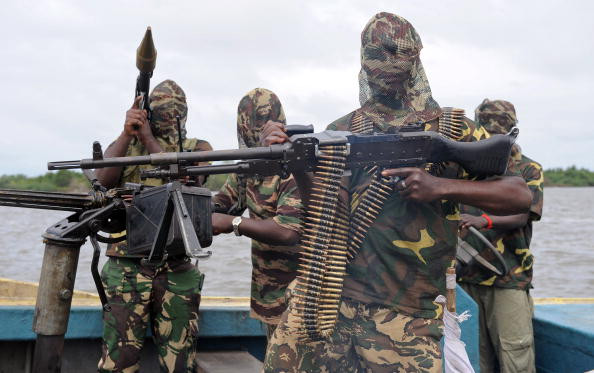Niger Delta violence: Avengers blow up NNPC pipeline as peace talks fail to begin
A militant group in Nigeria's oil-rich Niger Delta region has claimed responsibility for an attack at an oil pipeline owned by the state-owned Nigerian National Petroleum Corporation (NNPC). The Niger Delta Avengers (NDA) took to Twitter to confirm it blew up an NNPC-owned pipeline in Oruk Anam Local Government Area in Akwa Ibom State.
The attack in the early hours of Thursday (16 June) was carried out days after the group agreed to start a dialogue with the government to find a solution to renewed violence in the area.
The motive behind the latest attack is not yet clear. However, the group said the federal government must meet its demands before a "genuine" dialogue can take place.
Among other things, NDA urged the military to leave the restive south-east and the federal government "to commit member states of the multinational Oil Corporations to commit independent mediators to this proposed dialogue".
Earlier in June, Nigeria announced it would scale back its military presence in the Niger Delta in order to foster dialogue with militants. However, on Wednesday 15 June, the Ijaw People Development Initiative (IPDI) group, based in Delta State, alleged the government was not serious about a dialogue as soldiers kept "invading communities".
At 4:00am @NDAvengers blow up NNPC Pipeline in Oruk Anam Local Government Area in Akwa Ibom.
— Niger Delta Avengers (@NDAvengers) June 16, 2016
Attacks blamed on NDA forced Chevron and Royal Dutch Shell to close two plants, with the group vowing to bring the country's oil production down "to zero".
Nigeria, Africa's biggest oil producer, has already been negatively affected by renewed violence in the area as oil production has dropped to 1.6 million barrels per day (bpd), from 2.2 million bpd.

The birth of militant groups in Niger Delta
NDA is the latest militant organisation to wage war against Nigeria due to perceived marginalisation in the Niger Delta.
On 12 June, former militant Government Ekpemupolo, or "Tompolo" as he is also known, urged NDA to engage in talks with the government. However, Tompolo, chief commander of the Movement For The Emancipation Of The Niger Delta (Mend), is suspected of being behind NDA, which some analysts believe is simply Mend with a new name.
Militant groups in the oil-rich Niger Delta region took hold in the early 2000s following the deterioration of people's living conditions blamed on the increase of oil-related activities by foreign exploration corporations. Tensions flared up in the local communities as some ethnic groups felt they were being exploited and did not benefit from the crude oil on their land.
The repeated oil spills that considerably damaged the environment and affected people's health further deepened the communities' frustrations. After being elected in 2015, Buhari extended a 2009 amnesty granted to 30,000 former militants in the area.
Nigeria up close: Check out our Flipboard magazine
© Copyright IBTimes 2025. All rights reserved.






















